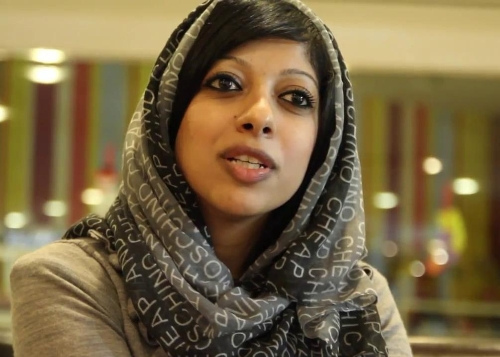Freedom of Speech Roundup
by Sampsonia Way / September 21, 2013 / No comments
In the weekly Freedom of Speech Roundup, Sampsonia Way presents some of the week’s top news on freedom of expression, journalists in danger, artists in exile, and banned literature.

Zainab al-Khawaja has been in prison for the last six months for her social media activism. Photo: Prachatai via Flickr.
A Bahraini Activist’s Message From Prison
New York Times. Imprisoned Bahraini opposition activist Zainab al-Khawaja has released an audio message from prison in which she recites a poem to “the brave people of Bahrain…and all of the freedom-loving people of the world.” Read More.
Egypt’s Journalists Still Under Siege, State of Emergency Extended
Committee to Protect Journalists. The Egyptian government has announced that the nation’s state of emergency will be extended for two months. Since July 3, at least 40 Egyptian journalists have been detained and the press censorship doesn’t appear to be slowing. Several new arrests and accusations were made this week, including Al-Ahram Gate reporter Emad Sayed Abu Zeid and Al-Masry al-Youm reporter, Ahmed Abu Deraa. Read More.
New York Times. Egyptian journalist, editor, and author Ibrahim Essa writes an account of one of his days in an environment where he constantly faces death threats from Muslim Brotherhood supporters. Read More.
German-Iraqi Wins ‘Literature in Exile’ Prize
Deutsche Welle. Abbas Khider, a novelist who sought asylum in Germany after being imprisoned for working with outlawed political parties in Baghdad, was awarded the Hilde Domin Prize. Read More.
Cuba: Pianist Banned and Forced to Cancel Shows
Free Muse. Cuban Pianist Robertico Carcasses has been indefinitely banned from performing in Cuba after a concert on September 12. At the concert, Carcasses voiced his desire for direct presidential elections. His band announced that two upcoming shows would be canceled on account of a “decision by authorities.” Read More.
China: Crackdown on Social Media Users, Dissident Arrested After TV Interview
The Guardian. The Chinese government has enacted a forceful crackdown on popular microblog users in the country, resulting in detentions and public confessions for online “rumor spreading.” Read More.
Sky News. Chinese activist and dissident Hu Jia was arrested last week along with several other activists in what some have dubbed “Black Friday.” The arrest came just days after Hu compared the CCP to the Nazi Regime in an interview. Read More.
Hu Jia is interviewed by Sky News shortly before his arrest. Video: allbitsofegg via YouTube.
From Cocaine to Fascism
New York Review of Books. In this strange story of self-exile, a young Italian named Dino Segre, writing under the pen name Pitigrilli, was championed by Mussolini for insulting the catholic church and Italian aristocracy. After an attempted conspiracy, service as a fascist spy, and exile in Switzerland, almost no one remembers who Segre is. Read More.
Violent Censorship on Rise in Afghanistan
Wall Street Journal. According to a Kabul-based organization for press freedom, there have been more than 60 cases of intimidation or violence against Afghan journalists this year—more than double the figure from the period a year earlier. However, such harassment is just the tip of the country’s press iceberg. Read More.
Iran Bars Social Media Again After a Day of Openness
New York Times. In what the Iranian government has called a “test,” long-blocked sites like Facebook and Twitter were opened for 24 hours, prompting jubilation from some and concern from others. Read More.
Moroccan Editor Arrested for Publishing Link to Video
Committee to Protect Journalists. Ali Anouzla, editor of the Arabic version of Lakome news website, was arrested by Moroccan police on Tuesday after posting an article that indirectly referenced a video from a branch of al-Qaeda criticizing the Moroccan King. The website has been placed on a publishing hold due to government investigation. Read More.
Tunisian Journalists on Strike
Tunisia Live. Journalists in Tunisia are protesting the multiple recent arrests of members of the media, including Zied el-Heni, president of the National Union of Tunisian Journalists. Read More.
Writers from around the world march to the Russian embassy in Reykjavik to express their concerns about challenges to free expression in the country
PEN International. Nearly 200 writers from over 70 countries protest Russia’s continued stifling of free speech. Read More.




